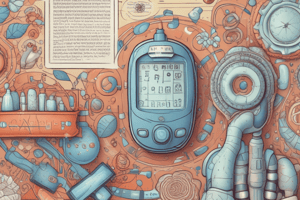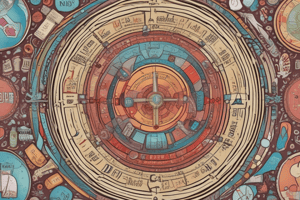Podcast
Questions and Answers
What is the main characteristic of Type 1 Diabetes?
What is the main characteristic of Type 1 Diabetes?
- Develops during pregnancy
- Caused by hormonal changes
- Body doesn't respond to insulin effectively
- Body doesn't produce enough insulin (correct)
What is a common symptom of Diabetes?
What is a common symptom of Diabetes?
- Runny nose
- Sore throat
- Fatigue (correct)
- Headache
What is the purpose of the Hemoglobin A1c (HbA1c) test?
What is the purpose of the Hemoglobin A1c (HbA1c) test?
- To diagnose Diabetes
- To check blood pressure
- To check cholesterol levels
- To monitor blood sugar levels over time (correct)
What is a potential long-term complication of Diabetes?
What is a potential long-term complication of Diabetes?
What is the main cause of Gestational Diabetes?
What is the main cause of Gestational Diabetes?
What is the primary treatment for Type 1 Diabetes?
What is the primary treatment for Type 1 Diabetes?
What is a common risk factor for Type 2 Diabetes?
What is a common risk factor for Type 2 Diabetes?
What is a short-term complication of Diabetes?
What is a short-term complication of Diabetes?
Flashcards are hidden until you start studying
Study Notes
Definition and Types
- Diabetes is a group of metabolic disorders characterized by high blood sugar levels
- There are three main types of diabetes:
- Type 1 Diabetes (T1D): Autoimmune disease, body doesn't produce enough insulin
- Type 2 Diabetes (T2D): Metabolic disorder, body doesn't produce or respond to insulin effectively
- Gestational Diabetes (GDM): Develops during pregnancy, usually in the second or third trimester
Causes and Risk Factors
- T1D: Genetics, autoimmune response, environmental factors
- T2D: Obesity, physical inactivity, genetics, family history, age, certain medications
- GDM: Hormonal changes, obesity, family history, age, previous history of GDM
Symptoms
- Increased thirst and hunger
- Frequent urination
- Fatigue
- Blurred vision
- Slow healing of cuts and wounds
- Tingling or numbness in hands and feet
- Recurring skin, gum, or bladder infections
Diagnosis
- Fasting plasma glucose (FPG) test
- Oral glucose tolerance test (OGTT)
- Hemoglobin A1c (HbA1c) test
- Random plasma glucose test
Treatment and Management
- T1D: Insulin therapy, lifestyle changes (diet, exercise)
- T2D: Lifestyle changes, oral medications, insulin therapy (if necessary)
- GDM: Diet, exercise, insulin therapy (if necessary)
- Monitoring blood sugar levels
- Managing blood pressure and cholesterol levels
Complications
- Short-term: Hypoglycemia (low blood sugar), hyperglycemia (high blood sugar), diabetic ketoacidosis
- Long-term: Heart disease, stroke, kidney disease, nerve damage, vision loss, foot damage
Definition and Types
- Diabetes is a group of metabolic disorders characterized by high blood sugar levels
- There are three main types of diabetes: Type 1 Diabetes, Type 2 Diabetes, and Gestational Diabetes
- Type 1 Diabetes (T1D) is an autoimmune disease in which the body doesn't produce enough insulin
- Type 2 Diabetes (T2D) is a metabolic disorder in which the body doesn't produce or respond to insulin effectively
- Gestational Diabetes (GDM) develops during pregnancy, usually in the second or third trimester
Causes and Risk Factors
- Type 1 Diabetes (T1D) is caused by genetics, autoimmune response, and environmental factors
- Type 2 Diabetes (T2D) is caused by obesity, physical inactivity, genetics, family history, age, and certain medications
- Gestational Diabetes (GDM) is caused by hormonal changes, obesity, family history, age, and previous history of GDM
Symptoms
- Increased thirst and hunger are common symptoms of diabetes
- Frequent urination is a symptom of diabetes
- Fatigue is a symptom of diabetes
- Blurred vision is a symptom of diabetes
- Slow healing of cuts and wounds is a symptom of diabetes
- Tingling or numbness in hands and feet is a symptom of diabetes
- Recurring skin, gum, or bladder infections are symptoms of diabetes
Diagnosis
- Fasting Plasma Glucose (FPG) test is used to diagnose diabetes
- Oral Glucose Tolerance Test (OGTT) is used to diagnose diabetes
- Hemoglobin A1c (HbA1c) test is used to diagnose diabetes
- Random Plasma Glucose test is used to diagnose diabetes
Treatment and Management
- Type 1 Diabetes (T1D) is treated with insulin therapy and lifestyle changes (diet, exercise)
- Type 2 Diabetes (T2D) is treated with lifestyle changes, oral medications, and insulin therapy (if necessary)
- Gestational Diabetes (GDM) is treated with diet, exercise, and insulin therapy (if necessary)
- Monitoring blood sugar levels is crucial for managing diabetes
- Managing blood pressure and cholesterol levels is crucial for managing diabetes
Complications
- Hypoglycemia (low blood sugar) is a short-term complication of diabetes
- Hyperglycemia (high blood sugar) is a short-term complication of diabetes
- Diabetic ketoacidosis is a short-term complication of diabetes
- Heart disease is a long-term complication of diabetes
- Stroke is a long-term complication of diabetes
- Kidney disease is a long-term complication of diabetes
- Nerve damage is a long-term complication of diabetes
- Vision loss is a long-term complication of diabetes
- Foot damage is a long-term complication of diabetes
Studying That Suits You
Use AI to generate personalized quizzes and flashcards to suit your learning preferences.




